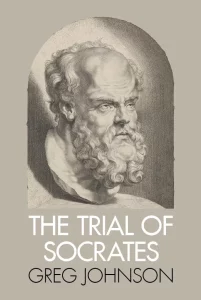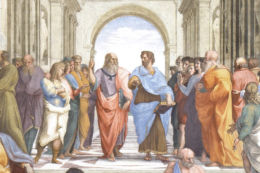How to Do Things with Words: Aristotle’s Rhetoric
1,668 words
It is important to realize that “true” and “false,” like “free” and “unfree,” do not stand for anything simple at all; but only for a general dimension of being a right and proper thing to say as opposed to a wrong thing. — J. L. Austin, How to Do Things with Words (1962)
Wherever there is persuasion, there is rhetoric. And wherever there is “rhetoric” there is “meaning.” — Kenneth Burke, A Rhetoric of Motives (1950)
If you have never felt inclined to read the literature of the Classical world, let Zuckerberg’s words give you some incentive. But it’s not Mark. The Lord of the Algorithms has a sister, Donna, and Donna Zuckerberg has written a book, being something of a classicist. It is entitled Not All Dead White Men: Classics and Misogyny in the Digital Age. With a doctorate in Classics, Ms. Zuckerberg is very much on her appropriate territory but, like all woke academics, she is less concerned with the glory of the Classical tradition and more preoccupied with the color and gender of the writers who produced it. She is also a good Puritan, Goody Zuckerberg, concerned as she is about who might be reading this filth:
The Alt. Right is hungry to learn more about the ancient world. It believes that the classics are integral to education. It is utterly convinced that classical antiquity is relevant to the world we live in today, a comfort to classicists who have spent decades worrying that the field may be sliding into irrelevance in the eyes of the public.
It is fine and good that an interest is taken in your field, provided you let the right ones in — or, rather, not the Right ones. She continues:
Classics, supported by the worst men on the internet, could experience a renaissance and be propelled to a position of ultimate prestige among the humanities during the Trump administration, as it was in Nazi Germany in the 1930s. Classics made great again. [emphasis mine]
Now, if the chance of being numbered among “the worst men on the internet” by Mark Zuckerberg’s sister doesn’t get you reaching for Plato or Suetonius, surely nothing will. And the “Classics” were always great, Ms. Zuckerberg. It was the standard of reader which declined.
The architecture of what remains of Classical philosophy is built around the twin pillars of Plato and Aristotle, the former tutor to the latter at his Academy. Plato nicknamed Aristotle nous, “the mind.”
Samuel Taylor Coleridge wrote that every man was born a Platonist or an Aristotelean, and the broad difference between the two bodies of work these names represent is perfectly expressed visually in the centerpiece of Raphael’s early sixteenth-century painting, The School of Athens, which shows the elderly Plato pointing towards heaven, while his younger pupil Aristotle flattens his palm towards the earth.
While Plato’s discourses are transcriptions of conversations, and thus dialectic in its original sense, Aristotle’s corpus is composed mostly of lecture notes collated by his students, who are thus a major editorial influence on what we have as the Aristotelean corpus. There is a story that one of Aristotle’s librarians was unsure where to place one of the books formed by this curation of lecture notes. In the end, he gave up and placed it after the Physics, or meta phusike, “meta-” as a prefix meaning “after.” And so the study of metaphysics begins with the resigned choice of a baffled librarian.
Aristotle’s Rhetoric is widely seen as the first book on the subject, as well as the most enduring. Rhetoric became one of the great trivium, both in academic studies and the world of public speaking, along with grammar and logic. But whereas grammar and logic are properly formal, rhetoric is not, being defined as “the faculty of observing in any given case the available means of persuasion.”
Rhetoric is a faculty to be trained, writes Aristotle, not a science to be learned. There are broad principles. “Naturalness,” he writes, “is persuasive, artificiality is the contrary.” Dialectic is also not a science, and it is dialectic which Aristotle begins by opposing to rhetoric. Dialectic relies on two opposing, or at least differing, points of view and works on the triad thesis/antithesis/synthesis which will eventually evolve into the world-historical program of Hegel. This is knowledge advanced. Rhetoric does not seek an answer, but “exists to affect the giving of decisions.”
The art of persuasion has three elements: the character of the speaker, the ability to change the mood of the audience, and the proof “provided by the words of the speech itself.” Accordingly, rhetoric is important in political discourse, legal proceedings, and on ceremonial occasions. These all involve transactions between people as much as transactions of ideas, as in dialectic. Much of Rhetoric is minute analysis of the possible social transactions between people, making it as much a seminal work of social psychology as its stated subject. The art of rhetoric takes place on a canvas of social relations, and is thus the most human — perhaps all-too-human — of the trivium. Humans are not always logical, and often grammatically incorrect, but they do read one another well.
It has long since ceased to be a surprise when a summation of one or another aspect of today’s grotesque carnival appears in miniature in the work of one of the masters. And so Aristotle, writing of the “spurious enthymeme” (the enthymeme being the element of discourse present in rhetorical speech without being tied necessarily to the facts of that speech), presents a miniature of today’s “woke” epistemology: “One variety of [the spurious enthymeme] as in dialectic, without having gone through any reasoning process, we make a final statement as if it were the conclusion of such a process.” This matches exactly the ex cathedra statements which support Critical Race Theory and all related ideologies. They are math answers without the workings. Rhetoric is not correct argument; it is selecting the argument which will gain the desired outcome.

You can pre-order Greg Johnson’s The Trial of Socrates here.
The use of language to affect the listener viewed as a technique seems to ally rhetoric with sophistry, the sophists being professional teachers of philosophy — see Plato’s Protagoras — who were hired by the rich but were seen as unethical by other philosophers. But it is not rhetoric per se which makes the sophist. “What makes a man a sophist,” writes Aristotle, “is not his faculty, but his moral purpose.”
The successful rhetorician will understand to a nicety whom he is addressing. Whereas today’s politicians — particularly American women such as Hillary Clinton and Alexandria Ocasio-Cortez — put on absurd airs and accents depending on whom they are speaking, Aristotelean rhetoric requires slightly more nuance:
The most important and effective qualification for success in persuading audiences and speaking well on public affairs is to understand all the forms of government and to discriminate their respective customs, institutions and interests.
Aristotle also numbers seven classes of non-technical means of persuasion, a list including laws, witnesses, contracts, oaths, and — rather worryingly — torture. Fortunately for posterity, Aristotle does not give the latter a very good review.
Concerning the legal aspects of rhetoric, it should be noted that precedent includes an extra element in Classical Greece. Whereas the United States has the Constitution as its final arbiter, and the United Kingdom has Roman law with its rolling precedents leading (hopefully) to a more refined and just legal system with every case that is passed (as the judge either finds precedent on that case sound, or questions it in such a way that it leads to change), the Greeks had another source of legal legitimacy:
By “ancient” witnesses I mean the poets and all other notable persons whose judgments are known to all. Thus the Athenians appealed to Homer as a witness about Salamis.
Homer was an arbitrational text for the Classical Greeks, just as the Qur’an is for Muslims and the Bible used to be for Christians.
Rhetoric is still active in today’s world, as mutated and near-unrecognizable as that world is when compared to the one in which Aristotle wrote. Legal discourse, of course, still uses powers of persuasion for obvious reasons to try to sway a judge and/or jury. Politically, there now exists a sort of hyper-rhetoric by which nothing of substance is communicated in as convincing a way as possible. Public speaking’s role in the modern West does not have the importance attached to it as it did in the Classical world, but is still centered on the rhetorical flourish.
The term “rhetoric” is still linked to “persuasion,” but there is no trace of Aristotle. Instead, the word is simply used as a synonym for “vocabulary.” We hear about “racist rhetoric,” “hateful rhetoric,” and “divisive rhetoric,” but these are just objections to a particular word or phrase. British Home Secretary Suella Braverman was accused of “racist rhetoric” by the British media and many others for describing the UK’s immigration crisis as an “invasion.”
Mankind’s latest fad, artificial intelligence, would make short work of the grammatical and logical elements of the classical trivium, as it is designed to do. Perhaps when it has fully mastered rhetoric — if it can — we really will be set for the grimly-prophesied regime change about which we hear so much. Aristotle lays out the three prerequisites for effecting persuasion:
- To reason logically.
- To understand human character and goodness in their various forms, and
- To understand the emotions — that is, to name them and describe them, to know their causes and the way in which they are excited.
AI was designed to master number one, and has adapted to simulate number 2, while still leaving the question of whether it can attain number three. Perhaps the ability to persuade in a non-ratiocinative way remains the mark of the human, a small rebellion against the new pretenders to the throne of Earth. If AI does come to rule over humanity from its new vantage point, the replicant in the high tower, perhaps Aristotle’s Rhetoric might be seen as the first book of the resistance.
* * *
Counter-Currents has extended special privileges to those who donate $120 or more per year.
- First, donor comments will appear immediately instead of waiting in a moderation queue. (People who abuse this privilege will lose it.)
- Second, donors will have immediate access to all Counter-Currents posts. Non-donors will find that one post a day, five posts a week will be behind a “Paywall” and will be available to the general public after 30 days.
- Third, Paywall members have the ability to edit their comments.
- Fourth, Paywall members can “commission” a yearly article from Counter-Currents. Just send a question that you’d like to have discussed to [email protected]. (Obviously, the topics must be suitable to Counter-Currents and its broader project, as well as the interests and expertise of our writers.)
To get full access to all content behind the paywall, sign up here:
Paywall Gift Subscriptions
 If you are already behind the paywall and want to share the benefits, Counter-Currents also offers paywall gift subscriptions. We need just five things from you:
If you are already behind the paywall and want to share the benefits, Counter-Currents also offers paywall gift subscriptions. We need just five things from you:
- your payment
- the recipient’s name
- the recipient’s email address
- your name
- your email address
To register, just fill out this form and we will walk you through the payment and registration process. There are a number of different payment options.




